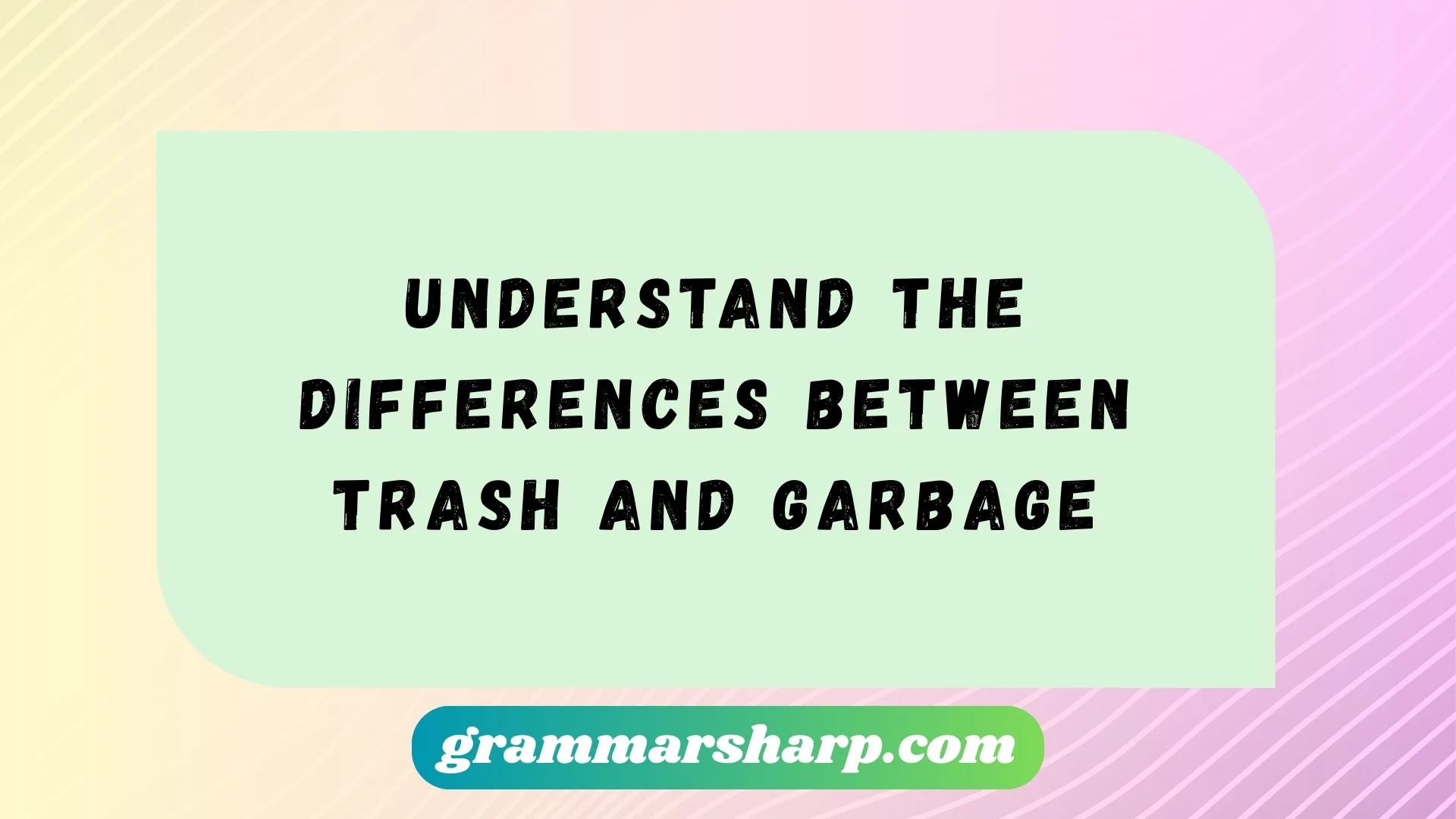Language has a funny way of confusing us sometimes. Take the words trash and garbage for example. Most people use them interchangeably in everyday conversations, but the truth is they don’t always mean the same thing. At first glance, it might seem like just a regional preference or a matter of habit. Yet, when you dig deeper, you’ll find that trash vs. garbage carries more meaning than you think. From waste management to environmental impact and even cultural expressions, knowing when to use each word makes a big difference.
Think about this: when you toss an empty soda can, do you say you’re throwing it in the trash or garbage? What about when you scrape leftover spaghetti into the bin? Chances are, you use both terms without realizing one might be more accurate than the other depending on the type of waste.
This confusion matters because the two words aren’t just about language—they reflect how societies manage waste, how governments regulate disposal, and how we, as individuals, understand sustainability.
Over the years, linguists, historians, and even environmental experts have looked at the trash vs. garbage debate from different angles. The result is a fascinating blend of grammar, culture, and practical knowledge. For travelers, students, or professionals, using the right term at the right time can save you from awkward misunderstandings. For eco-conscious readers, the difference can help you manage your waste more responsibly.
In this article, we’ll unpack everything you need to know about trash and garbage. You’ll learn their definitions, history, usage in different English-speaking countries, their role in waste management systems, and even how they appear in idioms and pop culture. We’ll also compare them in detail using examples, tables, and real-world context. By the end, you’ll never confuse the two again.
Defining Trash and Garbage
At the most basic level, trash and garbage both mean waste. However, the distinction lies in what kind of waste you’re talking about.
- Trash generally refers to dry waste. Think paper, cardboard, old clothes, broken toys, or plastic bottles. These are things that don’t rot quickly.
- Garbage usually refers to wet or organic waste. This includes food scraps, kitchen leftovers, coffee grounds, or spoiled vegetables.
Dictionary Definitions:
- Trash (noun): Waste material, especially things that are broken, useless, or no longer wanted.
- Garbage (noun): Refuse that includes food waste, organic matter, or items discarded from kitchens and households.
The Key Differences Between Trash and Garbage
While the two words overlap in casual conversation, the distinction becomes clearer when we look at practical use.
Here’s a quick comparison table:
| Feature | Trash | Garbage |
| Composition | Dry waste (paper, glass, plastic, metals, fabrics) | Wet waste (food scraps, organic matter) |
| Odor | Usually odorless or mild | Strong odor due to decomposition |
| Disposal Method | Often recyclable or reusable | Typically composted or sent to landfill |
| Examples | Old magazines, broken electronics, soda cans | Apple cores, leftover pasta, eggshells |
| Decay | Non-biodegradable or slow to decay | Biodegradable, decays quickly |
Key takeaway: Use “trash” when referring to non-food waste and “garbage” when referring to food or biodegradable waste.
Regional Language Preferences

Not all English speakers use these words the same way. Regional differences often determine whether people say trash or garbage.
- United States:
- Trash is common when talking about dry waste.
- Garbage is often used for food or kitchen scraps.
- Canada:
- Both words are used, though “garbage” is slightly more common.
- United Kingdom:
- People rarely say “trash” or “garbage.” They use “rubbish.”
- Australia & New Zealand:
“Rubbish” or “waste” are standard terms.
So, if you’re traveling in London, don’t ask where the trash can is—ask where the rubbish bin is.
Environmental Impact of Trash vs. Garbage
The words may seem small, but the impact on the environment is big. Understanding the difference helps with proper disposal.
- Trash (Dry Waste):
- Many items like glass, paper, and plastic can be recycled.
- Improper disposal leads to long-lasting landfill waste and ocean pollution.
- Garbage (Wet Waste):
- Organic waste produces methane gas when decomposed in landfills.
- Composting garbage turns it into nutrient-rich soil, reducing pollution.
Trash and Garbage in Waste Management Systems
Modern cities use waste segregation systems to make recycling and composting easier.
- Dry Waste Bins (Trash): Typically blue or black.
- Wet Waste Bins (Garbage): Typically green.
- Special Disposal: Hazardous waste (batteries, chemicals, e-waste) has its own collection system.
This separation helps reduce landfill size, improve recycling efficiency, and lower greenhouse gas emissions.
Case Study – San Francisco:
San Francisco has one of the most advanced waste management programs. They use a three-bin system:
- Blue for recyclables (trash).
- Green for compostables (garbage).
- Black for landfill items.
The city has achieved an impressive 80% landfill diversion rate, one of the highest in the world.
Historical Background of the Terms
- Trash: Originates from the late Middle English word trasshe, meaning “fallen leaves” or “twigs.” Over time, it expanded to mean broken or discarded items.
- Garbage: Dates back to the 15th century, from the Old French word garbage, meaning “offal” or the waste parts of an animal. Early usage was closely tied to food remains.
This historical context explains why we still link garbage to food waste today.
Common Mistakes in Using Trash vs. Garbage
People often misuse the two words because of cultural blending and casual language.
Examples of common mistakes:
- Saying “garbage can” when throwing away old magazines. (Better: trash can.)
- Calling banana peels “trash.” (Better: garbage.)
- Writing “trash day” when the city actually collects both dry and wet waste separately.
Tip: If it rots, it’s garbage. If it doesn’t, it’s trash
Idioms and Expressions Using Trash and Garbage
The terms go beyond literal meaning. They also show up in idioms and slang:
- “One man’s trash is another man’s treasure” – What’s useless to one may be valuable to another.
- “Talking trash” – Speaking boastfully or insultingly, especially in sports.
- “Garbage in, garbage out” (GIGO) – A computing term meaning poor input leads to poor output.
- “Trashy behavior” – Refers to low-class or offensive conduct.
- “Take out the garbage” – A literal and metaphorical phrase meaning to remove waste or negative things.
Global Waste Vocabulary
English isn’t the only language that struggles with waste terminology. Even within English, the words vary:
| Country | Common Term | Example |
| United States | Trash / Garbage | “Put it in the trash can.” |
| United Kingdom | Rubbish | “Throw it in the rubbish bin.” |
| Canada | Garbage / Trash | “The garbage truck comes on Tuesday.” |
| Australia | Rubbish | “Take the rubbish out.” |
| India | Waste | “Segregate your waste into wet and dry.” |
Travelers should adjust their language to match the local preference
Examples in Sentences
Correct Use of Trash:
- I threw the broken chair in the trash.
- Please put those old papers in the trash bin.
- The recycling center collects trash like glass and plastic.
Correct Use of Garbage:
- The kitchen garbage smells bad if not taken out daily.
- We use food scraps from the garbage to make compost.
- Don’t put coffee grounds in the trash, they go in the garbage.
FAQs on Trash vs. Garbage
Is there a real difference between trash and garbage?
Yes. Trash usually refers to dry waste, while garbage refers to food or organic waste.
Which term is more common in American English?
Both are common, but “trash” is slightly more frequent in everyday speech.
Do British people use garbage?
Not usually. They prefer “rubbish.”
Can trash mean slang?
Yes. “Trash” can describe someone or something of low quality, like “trashy TV shows.”
Why do we say garbage truck and not trash truck?
In the US, “garbage truck” became standard because most early waste collection focused on food scraps
Final Thoughts
While the words trash and garbage often overlap in casual use, knowing the difference makes your language sharper and your waste management smarter. Remember:
- Trash = dry, non-decaying items.
- Garbage = wet, decaying, or food waste.
This simple distinction helps in communication, travel, and eco-friendly living. It also reveals a lot about how cultures view waste and sustainability. Next time you’re about to toss something out, pause for a moment. Ask yourself: is it trash or is it garbage? That small choice can make a big difference.

